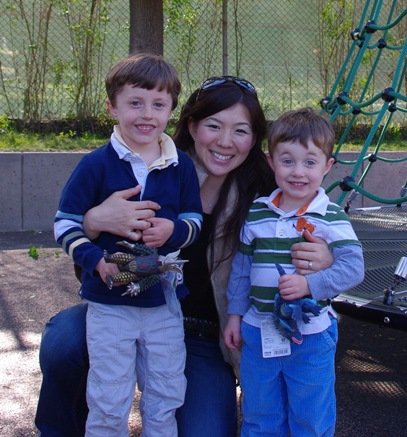
Nothing can be more important than finding the right care for your children in a new country. And when it comes to childcare, New York can feel like a foreign country – even to Americans.Many internationals moving to the city or Tri-State area will be shocked by how difficult it is to find pre-schools for your little ones. This can be especially true for the three years-and-under set. Not only are childcare places for one and two year olds sparse, they can be very expensive, easily running to $20,000 or more per year. On top of this, these daycares or preschools often don’t fully cover your need for childcare – there are many holidays and vacation periods in which these centers will be closed.The reality is that you’ll soon discover the need to look for additional childcare options. Basically there are three options to look at: nannies, au pairs and the occasional babysitter.While nannies and au pairs will work very closely with your family (for example, nannies commonly expect a weekly employment of at least 20 hours, while au pairs work 45 hours a week) babysitters are mostly used for covering evenings out or the occasional afternoon. If you have friends with teenage daughters, or friends who often use babysitters, ask around: often a trusted babysitter recommendation from a friend takes the stress out of leaving your children for an evening. Usually babysitters are paid by the hour: the range for New York can be between $12 and $18 an hour, plus be prepared to pay the cab fare home if it gets late.
Nannies
Nannies are the most common form of babysitters in New York City for those who need extensive care. Legally, they are considered domestic workers and often came as immigrants to the U.S. from the Caribbean and South America, but you will also find Europeans and Asians in the mix. In most cases, nannies will commute to their place of work, often from the outer boroughs of the Bronx, Queens, and Staten Island, or even Long Island. There are also live-in nannies, who receive room and board (just like an au pair) from their employers.While it’s hard to generalize, nannies have often brought up their own children or have helped with bringing up large families back home, including helping to raise siblings or nieces and nephews. Knowing the family background of a nanny will help you to evaluate her experience with children, but most importantly she should be able to provide references from families she has worked with. Nannies should be interviewed in person, checking for previous experience, and often enough are expected to bring in recommendations of their childcare experience. A lot of times, nanny agencies will do the job of checking references and work experience, but it doesn’t hurt to do your own research. You should also make sure to arrange for a “play date” with your children and the prospective nanny.Let’s talk about money: What will it cost you to employ a nanny? The average pay per hour (for one child) is around $16 per hour, but rates vary. In general, rates start at a minimum of $11 per hour and can go up to $20 per hour. So, employing a nanny on a 40 hour weekly contract can leave you with a bill of over $3000 per month. Some of the childcare cost is tax deductible. To get the credit, you need to give the name and address of the caretaker that provides the child care, as well as their social security number or taxpayer identification number.Under New York’s Domestic Workers’ Bill of Rights nannies, housekeepers, and caretakers are given one day off per week, overtime pay for anything over 40 hours a week, three paid days off annually, and legal recourse when their rights are violated. Live-in nannies receive overtime after a 44-hour work week.The upsides of using a nanny for your child? You’re more likely to hire a pro, with years of experience in watching kids.The cons? Work hours might not be as flexible as with an au pair, as nannies often have their own family to take care of. You need to be able to agree on fixed hours in advance – your nanny will expect you to be on time when her work day is over. As mentioned before, a minimum work arrangement for a nanny is around 20 hours per week; most nannies will ask for a full work week and at least a 40 hour commitment. If parents are working full time, you can easily calculate 50 or even 60 hour work weeks with nannies though things will change once the children attend pre-school / kindergarten.
Au Pairs
Many internationals, especially Europeans, are used to the concept of getting an au pair who lives in with the family to take on overseeing the kids. You need to accept an au pair as an additional family member, as he or she will get to know your family intimately. When you live in New York City this concept can be tricky, as there’s often simply not enough space to host an extra person in your apartment. Still, it might be worth your while to consider renting or buying an apartment with an extra (small) bedroom. In pre-war apartments these small bedrooms were previously constructed for maids, and are often still called the maid’s room. Let’s look at the other details involved in getting an au pair.
The need for an agency
What does it mean to host an au pair for a year?
Most of all, you need to be prepared to welcome another family member into your home. It is not only the additional space that is needed, but it is guidance and responsibility for a young adult, who often comes to this country with many questions. After having hosted more than seven au pairs we know it can be the most wonderful experience when your kids call your au pair their sister or brother; equally, it can be challenging when you realize it isn’t working out.On the cost side, hosting an au pair comes with the following responsibilities:- Annual au pair agency cost of $5000 – $7000- Weekly stipend of $200 (annual cost around $10,000)- A one time $500 education fee- Room and board – the au pair can expect to share most meals with you and have free access to food. The advantages of having an au pair over a nanny on a monetary basis are easy to explain: It is a lot less expensive to hire an au pair over a full time nanny – the overall hourly cost can be as low at $7.75 for an au pair, (factoring in all the costs listed above), compared to $12 – $20 per hour for a nanny. Also the au pair solution offers you more flexibility: the weekly schedule gets discussed in advance but au pairs are expected to work whenever needed, as long as the daily amount does not exceed ten hours and the weekly hours don’t exceed 45.On the downside, once you have found the au pair that you love, you have to realize that he or she will only stay for one year, so be prepared to go through an ongoing cycle of au pairs. It is possible to extend an au pair for additional year, but often au pairs have plans to go to college and will only commit to stay for one year.Whether you choose an au pair or a nanny, it is still a very personal choice – not an easy one either way – but once you picked the right person, your life really will be so much easier.
The advantages of having an au pair over a nanny on a monetary basis are easy to explain: It is a lot less expensive to hire an au pair over a full time nanny – the overall hourly cost can be as low at $7.75 for an au pair, (factoring in all the costs listed above), compared to $12 – $20 per hour for a nanny. Also the au pair solution offers you more flexibility: the weekly schedule gets discussed in advance but au pairs are expected to work whenever needed, as long as the daily amount does not exceed ten hours and the weekly hours don’t exceed 45.On the downside, once you have found the au pair that you love, you have to realize that he or she will only stay for one year, so be prepared to go through an ongoing cycle of au pairs. It is possible to extend an au pair for additional year, but often au pairs have plans to go to college and will only commit to stay for one year.Whether you choose an au pair or a nanny, it is still a very personal choice – not an easy one either way – but once you picked the right person, your life really will be so much easier.

